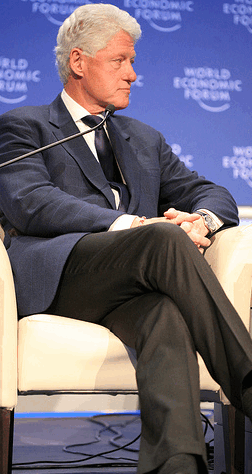 Apparently Shanghai Tang and Toni Maticevski have been quicker to see the writing on the wall (also known as the financial crisis) than the World Economic Forum (WEF). That’s why the designers dropped the razzmatazz of the catwalk for more intimate surroundings to showcase their collections; both fashion houses felt the move would give attendees an environment more conducive to serious discussion.
Apparently Shanghai Tang and Toni Maticevski have been quicker to see the writing on the wall (also known as the financial crisis) than the World Economic Forum (WEF). That’s why the designers dropped the razzmatazz of the catwalk for more intimate surroundings to showcase their collections; both fashion houses felt the move would give attendees an environment more conducive to serious discussion.
For the 2010 WEF, this would mean going back to its roots and making sure that, just like the old days, delegates from different walks of life (e.g., environmental activists, nonprofit managers, bankers and politicians) have the opportunity to meet, learn from and get inspired by each other. This is the way to find innovative and creative solutions that help reduce poverty and inequality while supporting justice for all.
Because of its size, Davos no longer allows for bright minds from different walks of life and science to meet in the same room. For instance, while some managers discussed Water and Politics, providing the audience with tons of valuable information, Michael Arrington and fellow geeks were elsewhere at the same time that 40 trade ministers were holding their informal meetings. But as a panellist indicated, without resolving the issue of water (e.g., it takes 1,500 liters of drinking water to produce 1 liter of biofuel) most of the green ideas or trade issues we are discussing to try to resolve world poverty cannot be implemented. Without drinking water, nothing works properly. Just to get everyone on the same page, during WEF more than 4 million people were, and still are, suffering under serious drought conditions in China. The severe water shortage makes drinking water hard to come by and irrigation nearly impossible. Over 100 days without rain caused this particular disaster; nevertheless, drinking water is not high on decision-makers’ agendas:
The above forum indicates that suffering due to water shortages is constantly increasing; any green initiative (i.e., reducing carbon footprint, hybrid cars, etc.) that fails to address the issue of drinking water misses the point.
Almost two weeks have passed since the world’s business and political elites concluded the World Economic Forum. Now that we have had time to reflect on Davos, we can say with some certainty that most hopes for the meeting have been dashed. Delegates from the UK returned home to the grim results of the heaviest snow falls in almost 20 years and the resulting chaos at Heathrow airport. Their response to the situation follows:
Might it be time to trade the razzmatazz of the catwalk for more intimate settings, find some breathing space and actually get some work done? Would it help to get big names like Michael Arrington, Bill Clinton and Al Gore in a room with some water experts to address the practical issues of how these luminaries might help us lead by example? Michael Arrington’s carbon footprint from Twitter usage is already over 300 kg a year and will soon hit 500. How much drinking water is used to sustain Bill Clinton and Al Gore’s fancy lifestyles?
While delegates arrived at Davos brave, fresh and sometime even funny, the above indicates that, unfortunately, that all changed once the official conference started on January 28. The influential people being interviewed and giving statements about the economy to all kinds of media set the tone. These delegates battled through public wrath, pain and surly defiance to the point where they tended to acknowledge that they were flustered and confused. Some even admitted they were leaving without having found the holy grail to resolving the financial crisis. In art or music we might say Davos 2008 was a beautifully nuanced and moving duet, but was it?
If Davos dies, what will you miss?
Some people claim, “It’s not about sexuality; it’s about looking great,” or things like, “The men’s makeover that you’re afraid to have – just get over it!” Maybe Davos needs a makeover so that when we’re asked, “If Davos dies, what will you miss?” we can again say:
- “The people. Such an amazing group. I know it sounds cliché. But this experience has been so amazing.” Or are we talking about Lipstick Jungle, a popular NBC show in its second season?
 The Nico Reilly character (see image left) is probably a good example of what Davos needs: some super-high heels and a bit of no-nonsense grit. Lipstick Jungle is loosely based on the lives of three middle-aged women who are going through their mid-life crises. Surely this applies to WEF Davos; unless some measures are taken, next year won’t bring us the improvement we are all dying to see.
The Nico Reilly character (see image left) is probably a good example of what Davos needs: some super-high heels and a bit of no-nonsense grit. Lipstick Jungle is loosely based on the lives of three middle-aged women who are going through their mid-life crises. Surely this applies to WEF Davos; unless some measures are taken, next year won’t bring us the improvement we are all dying to see.
The tweet captured below indicates how dreadful it must have been for some of the world’s business elite.
I remember a time when Klaus Schwab convinced everyone attending not to wear ties, in the hope that this would bring a bit more informality, daring and a splash of creativity. But oh, how things have changed in the last few years. For instance, World Trade Organization (WTO) Director-General Pascal Lamywas chastised by some of the press for not wearing a shirt and tie – the normal Davos uniform – instead choosing to wear a nice sweater under his jacket. The more things change, the more they stay the same. For starters, the Davos dress code definitely needs to change.
Hierarchy stifles creative thinking
When the most informal apparel allowed by a dress code is exemplified by Bill Clinton wearing a pair of nice pants with a jacket, tie and white shirt instead of a suit, things aren’t going that well, are they? However there is a larger problem than Davos needing a fashion brush-up: everything happens according to a carefully orchestrated system of hierarchies. Who you are and where you come from matters a great deal. And we know that this stifles creativity and innovation.
Hence, depending on where you rank on the totem pole you may get to commute from Zurich airport to the no-fly zone at Davos in a helicopter. A bit lower in the hierarchy, and a limousine with driver will give you a pleasant ride from the airport to Davos. And yes, some just try to reduce their carbon footprint by using public transport, in this case a beautiful train ride.
Even the delegate badges indicate where you rank in the pecking order.
Old ways determine where you will be housed during the event. Exalted personages like Niall Ferguson discovered that their new status was worth just so much and no more: they did not warrant staying in Davos but were given a room in Klosters, the village down the hill.
Shoes are an issue you must deal with
So maybe we need a makeover for Davos to get it moving again. How about new clothes, shoes and a new haircut for next year’s event?
 Everyone on Lipstick Jungle, including our friend Nico Reilly, seems to wear high-heels (read eight-inch or 19 cm stilettos) wherever they go; probably not very suitable for the snowy roads in Davos. But we all know that a makeover or just wearing different shoes to the office does not change our personality. It may, however, change how we are perceived by the public. Case in point from Davos:
Everyone on Lipstick Jungle, including our friend Nico Reilly, seems to wear high-heels (read eight-inch or 19 cm stilettos) wherever they go; probably not very suitable for the snowy roads in Davos. But we all know that a makeover or just wearing different shoes to the office does not change our personality. It may, however, change how we are perceived by the public. Case in point from Davos:
Apparently, a CEO set to attend Davos got himself a Twitter account and started Tweeting just before the conference got underway (maybe he felt the need to look like he is on the cutting edge). He ended up with 306 followers but that many followers based on a mere 46 tweets in just six days does not mean you were insightful or gave followers within your organization added value It also does not mean that those followers actually care about your tweets from #Davos. Just to set you straight, have a look at ![]() mediaphyter and her post, I am popular on Twitter, where she nicely explains this Fata Morgana.
mediaphyter and her post, I am popular on Twitter, where she nicely explains this Fata Morgana.
 So when I heard over the Twitter channel about Mark Zuckerberg wearing a tie, I thought I was attending the Paris show of one of the main couture labels. That was the last thing I was interested in, what I cared about was what Mark had to say about how he saw privacy being further eroded by Facebook readers. Apparently even at such an important event like Davos, gossip gets people’s attention, as this tweet suggests:
So when I heard over the Twitter channel about Mark Zuckerberg wearing a tie, I thought I was attending the Paris show of one of the main couture labels. That was the last thing I was interested in, what I cared about was what Mark had to say about how he saw privacy being further eroded by Facebook readers. Apparently even at such an important event like Davos, gossip gets people’s attention, as this tweet suggests:
Telling me about such unimportant things 24 hours after the fact does not get me excited about using Twitter for breaking news. The re-tweeting of this Zuckerberg tie story is the kind of news that jams my Twitter ‘inbox’. Nor do such tweets provide me with the type of quality of information I want to get out of WEF at Davos. Here are just two tweets out of several from this session that provide a bit more meat:
Would it have been better to follow others and report about panellists wearing ill-fitting suits and stiletto pumps during speeches instead? Do we really care for such gossip? Apparently so. Just imagine Mark Zuckerberg had worn a tie and shown off his new stiletto heels that he borrowed from a friend (see image above, left). Social media channels such as Twitter and Facebook would have crashed trying to spread the story fast enough. Unfortunately, gossip wins hands down over substance and I must admit that Davos is no different.
Bottom Line, or Wake Me When You Make Me Over
Troubles shared at Davos make their way onto the web, thanks to social media such as Twitter. Unfortunately, it is neither a trouble halved nor a result one can work with to quickly resolve the financial crisis. Instead, as Ms. Ramos suggested, it is a trouble or a feeling of doom needlessly multiplied around the globe in an instant:
Joanne Jacobs published a very insightful post about social media and interacting, Davos and public interaction with complex issues. Having social media neither improves the content and depth of sessions during Davos nor increases sharing of thoughts and innovative solutions that might come up during one of these discussions:
Maybe Davos should follow designers such as Shanghai Tang and zap the razzmatazz of the catwalk in favour of more intimate settings (see above). For Davos this might result in more practical solutions and suggestions instead of leaving us with substance-free glitz and more navel-gazing (see Zuckerman and his tie). What is needed is to get the bright minds from different walks of life to attend events like Davos or TED; they will most certainly discuss carbon, drinking water, trade, bonus systems that fail and come up with workable solutions. Just getting the usual suspects to discuss the financial crisis or new technology gadgets is unlikely to give us a fresh and more practical approach to deal with the economic disaster we face now or the threat of drinking water shortages due to climate change.
Just in case we forgot, our situation is bad and things are getting worse. For instance, January brought the loss of 598,000 jobs in the US, while the unemployment rate – 4.4 percent before the credit crisis – jumped to 7.6 percent in January, its highest level since 1992. Out of a total 135 million jobs, the US economy has now shed 3.6 million since the recession began in December 2007.
Maybe Davos and TED delegates learned at least one thing during their 2009 attendance, namely the paradox of success, one that Candace Bushnell (writer of Lipstick Jungle and Sex and the City) successfully related and captured in her book. Getting older does not necessarily mean getting wiser, and power carries with is both benefits and pitfalls.
P.S. Instead of returning to WEF Davos and TED in 2010 for more preaching of the gospel to the converted, Al Gore should come down to earth and do something practical. Lead by example to help us deal with climate change.
Some estimates suggest that a European uses about 296 kg of paper each year, requiring over 500 kg of wood. Unfortunately, producing 1 kg of paper requires another 98 kg of other limited resources, including energy and water, to say nothing of the pollution it causes. Compare that to the average annual consumption of a person in Africa, a mere 12 kg of paper. A practical approach is to address our paper consumption if we want to deal with climate change, because once everybody consumes paper at a rate 100 kg per year, no forests will be left. We can barely comprehend the trouble this would cause our food production and supplies of drinking water.
For WEF 2010 I suggest we launch a contest:
- Al Gore, Claudia Schiffer and other famous people like Bono commit to reducing their paper consumption, waste of drinking water and/or carbon footprint to 50 percent of the average US consumer. (Al Gore, no more helicopter rides please, duh!)
The loser of the WEF 2010 Sustainability Contest, and this is the best part, will do some ‘real’ work for the environment: he or she will do on-site volunteer work in the Amazon with a non-profit organization helping to better protect our rain forests. A report on their practical experiences will be published and presented during Davos 2011. Why, because talking about green and environmental issues is great but actions speak louder than words. We have to help Al Gore achieve some actionable outcomes by getting his nose down to the grindstone…
FREE tool – Corporate Water Gauge – Measuring AND Reducing water use
P.P.S. If you think their carbon footprints are not an issue for Davos delegates, think again. ExecuJet handles private executive jets destined for WEF Davos landing at nearby airports (e.g., Zurich); they got more requests for private flights this year than ever before.
=========>
Here’s my suggestion for today. If you want to get breaking news, insights and irreverent commentary about WEF Brazil, Jordan, Africa 2009 and the upcoming Davos 2010, plus why Al Gore may go on pontificating about the climate crisis at such events while failing miserably at reducing his own carbon footprint, follow ![]() WEFdavos
WEFdavos
What is your take, how do you perceive this situation? Please share your insights and comments below, I look forward hearing from you.
=========>
Addendum: It is easy to chant ‘grow green,’ nevertheless, it is much harder to come up with concrete steps to reduce environmental footprints. Mr Gore’s massive personal carbon footprint from his house, house boat, idling limousines outside the Davos conference center and use of private jets and helicopters demonstrates this.
Pingback: World Economic Forum
Pingback: Urs E. Gattiker